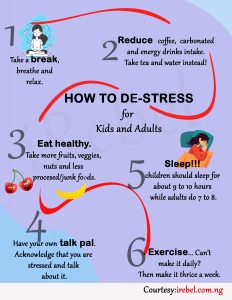How do you deal with stress? Are your ways of de-stressing even effective? Very many persons do not do so well when they are stressed or overwhelmed. And when they try to combat “the stress”, they only end up increasing their stress levels. How? They expose themselves to more stressors. Why? Because they think that they are de-stressing.
Stressors are basically anything that leads to the production of the stress hormones. It could be sleep deprivation, hunger, school, emotions, trauma… the list is endless.
It’s a cycle. One in which kids and teens are not left out from. Stress is basically your body’s way of saying “time out, I repeat, time out. I am about to shut down” in a robotic voice, of course.
What happens in our bodies when we are stressed? Simple, we have a high level of the stress hormone – cortisol. We suffer from chronic stress when high cortisol levels remain in our systems for quite a very long while. With chronic stress, comes a lot of other undesirable ailments – cardiovascular problems (heart attack), diabetes, high blood pressure etc.
But cortisol isn’t the only stress hormone we have. There is epinephrine (AKA adrenaline) which has a short lifespan hence, not a long-lasting hormone like cortisol.
Why and how do children feel stressed?
According to the American Psychological Association, the primary stressors for younger children include the home and the school. As a parent, you can’t necessarily control what goes on in school but you can, at home. One good way to deal with stress at home will be to learn how to effectively deal with yours.
Why? Simple, when you are stressed and things are getting out of control, then you are more likely to get irritable or lash out at the kids. These kids just don’t get affected by your stress; they also copy your coping mechanisms. They watch how you deal with stress and mimic it.
If you lash out, then they will as well. What about cussing? Trust me, they are going to fill up the swear jar – if you have one. And if you binge on junks, they will do that as well. That’s why you cannot afford to deal with stress wrongly.
Want to deal with stress? Learn the signs and symptoms
The signs and symptoms for stress are pretty much the same for both children and adults. Our bodies are the same regardless of age and size.

- Irritability and anger issues – when it concerns children, a more appropriate term will be acting out.
- Change in sleeping patterns – this involves difficulty falling asleep, oversleeping and not getting enough sleep.
- Bed-wetting – a sudden bed-wetting spell or more frequent bed-wetting episodes, especially for older children and young adults.
- Poor grades – a child doing well in school who suddenly keeps bringing home poor grades might be stressed and having trouble concentrating.
- Kids might become clingy, have nightmares and might even pick up new bad habits.
- Overeating or under-eating – how is the plate of food doing?
- Low self esteem
- Nausea, belly ache and constipation – these affects both children and adults.
Remember, one person cannot and will not experience all these. Our bodies, though the same do not respond to stress in one universal language.
How to deal with stress!
It is not rocket science but you have to put in some work and effort to get good de-stressing results.
- Create a balance – you have a lot on your plate (work, play, family) and it is overwhelming unless you find some sort of balance. Kids also should create a balance and yes, they’ve got a lot on their plate as well – help them shuffle conveniently between school and play.
- Exercise – stop waiting until you are almost burned out before you do some exercise. Make it a weekly family activity if a daily activity can’t work – or better still, thrice a week.
- Dump the excess caffeine – reduce your cups of coffee and substitute with tea instead. Tea has less caffeine.
- Sleep! Just sleep. The kids should have at least 9 to 10 hours’ worth of good sleep and you should get 7 to 8.
- Screen time should be closely monitored. Do not let the kids watch disturbing contents. You shouldn’t too. If the news overwhelms (keep safe link) you, turn the TV off.
- Say no to too much sugar – taking energy drinks once a while is fine but if you have to rely on it every day, stop! Take a break from it and take water or fresh juice instead.
- Cut down on the junk foods, and eat healthy. Eat more fruits and vegetables. Processed foods are never a good option.
- Stay away from alcohol.
- Meditate or do yoga, if you are a fan.
- Talk about it. Find a trusted person and open up to that person. You can encourage younger children to write about how they feel – you can, too.
- When things get overwhelming, lie back and relax.

Understand your body. When you feel stressed, remember that your body just needs a break. It is literally begging you to give it a moment and clear up the large amounts of cortisol in your body. Give it time to breathe.



2 Comments
Samuel Ifeanyi · April 24, 2020 at 4:28 pm
I’ve been through a lot of stress lately and I’ve never even thought of dealing with it.
I’m glad I saw it. I’ve seen a few things I could do to help myself de-stress.
Thanks for posting!
iRebel · April 25, 2020 at 3:30 am
Thanks for reading Ifeanyi! I hope your destressing journey goes well ♥
Comments are closed.